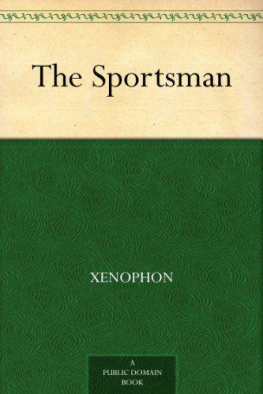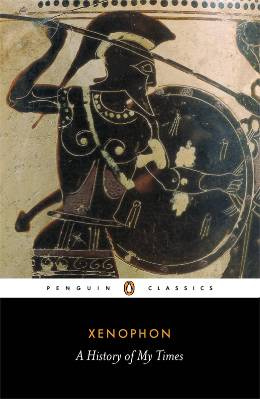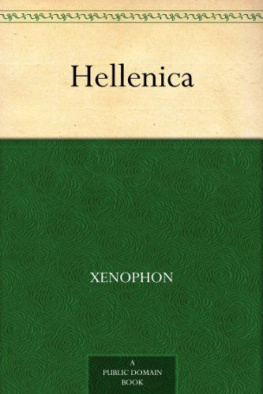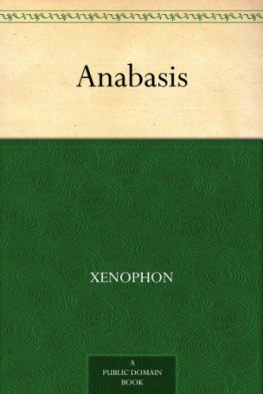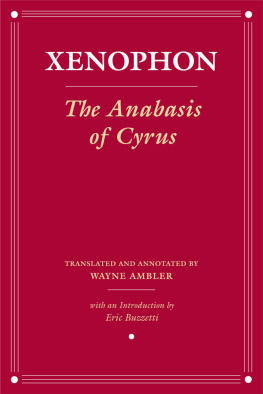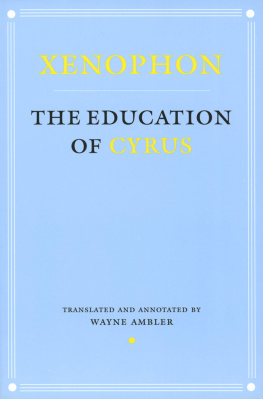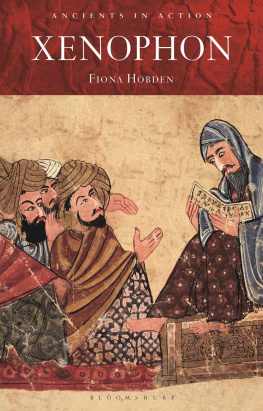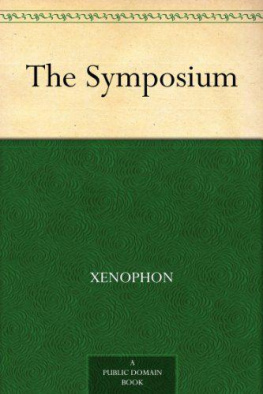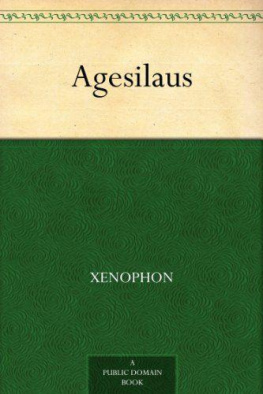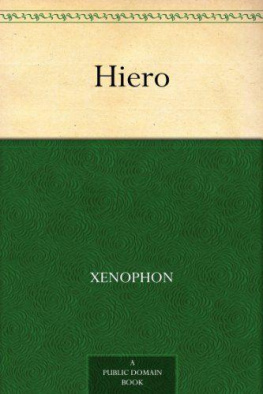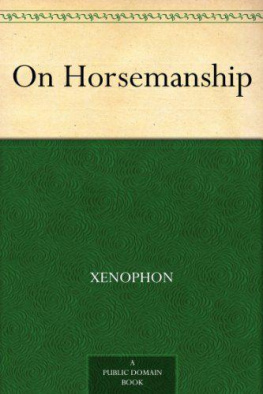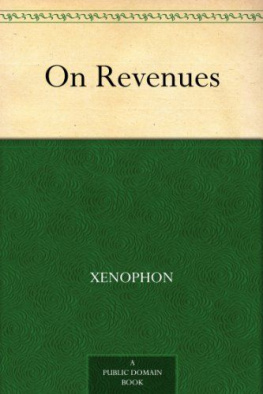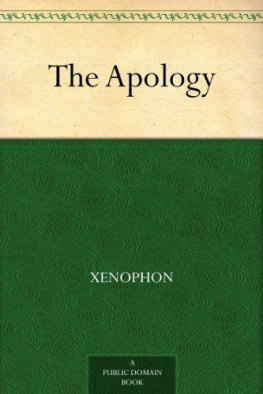Xenophon - The Sportsman
Here you can read online Xenophon - The Sportsman full text of the book (entire story) in english for free. Download pdf and epub, get meaning, cover and reviews about this ebook. year: 2012, genre: Detective and thriller. Description of the work, (preface) as well as reviews are available. Best literature library LitArk.com created for fans of good reading and offers a wide selection of genres:
Romance novel
Science fiction
Adventure
Detective
Science
History
Home and family
Prose
Art
Politics
Computer
Non-fiction
Religion
Business
Children
Humor
Choose a favorite category and find really read worthwhile books. Enjoy immersion in the world of imagination, feel the emotions of the characters or learn something new for yourself, make an fascinating discovery.
- Book:The Sportsman
- Author:
- Genre:
- Year:2012
- Rating:3 / 5
- Favourites:Add to favourites
- Your mark:
- 60
- 1
- 2
- 3
- 4
- 5
The Sportsman: summary, description and annotation
We offer to read an annotation, description, summary or preface (depends on what the author of the book "The Sportsman" wrote himself). If you haven't found the necessary information about the book — write in the comments, we will try to find it.
The Sportsman — read online for free the complete book (whole text) full work
Below is the text of the book, divided by pages. System saving the place of the last page read, allows you to conveniently read the book "The Sportsman" online for free, without having to search again every time where you left off. Put a bookmark, and you can go to the page where you finished reading at any time.
Font size:
Interval:
Bookmark:
Xenophon the Athenian was born 431 B.C. He was a
pupil of Socrates. He marched with the Spartans,
and was exiled from Athens. Sparta gave him land
and property in Scillus, where he lived for many
years before having to move once more, to settle
in Corinth. He died in 354 B.C.
The Sportsman is a manual on hunting hares, deer
and wild boar, including the topics of dogs, and
the benefits of hunting for the young.
PREPARER'S NOTE
This was typed from Dakyns' series, "The Works of Xenophon," a
four-volume set. The complete list of Xenophon's works (though
there is doubt about some of these) is:
Work Number of books
The Anabasis 7
The Hellenica 7
The Cyropaedia 8
The Memorabilia 4
The Symposium 1
The Economist 1
On Horsemanship 1
The Sportsman 1
The Cavalry General 1
The Apology 1
On Revenues 1
The Hiero 1
The Agesilaus 1
The Polity of the Athenians and the Lacedaemonians 2
Text in brackets "{}" is my transliteration of Greek text into
English using an Oxford English Dictionary alphabet table. The
diacritical marks have been lost.
To the gods themselves is due the discovery, to Apollo and Artemis, patrons of the chase and protectors of the hound. (1) As a guerdon they bestowed it upon Cheiron, (2) by reason of his uprightness, and he took it and was glad, and turned the gift to good account. At his feet sat many a disciple, to whom he taught the mystery of hunting and of chivalry (3)to wit, Cephalus, Asclepius, Melanion, Nestor, Amphiaraus, Peleus, Telamon, Meleager, Theseus and Hippolytus, Palamedes, Odysseus, Menestheus, Diomed, Castor and Polydeuces, Machaon and Podaleirius, Antilochus, Aeneas and Achilles: of whom each in his turn was honoured by the gods. And let none marvel that of these the greater part, albeit well-pleasing to the gods, nevertheless were subject to deathwhich is the way of nature, (4) but their fame has grownnor yet that their prime of manhood so far differed. The lifetime of Cheiron sufficed for all his scholars; the fact being that Zeus and Cheiron were brethren, sons of the same father but of different mothersZeus of Rhea, and Cheiron of the nymph Nais; (5) and so it is that, though older than all of them, he died not before he had taught the youngestto wit, the boy Achilles. (6)
(1) Or, "This thing is the invention of no mortal man, but of Apollo
and Artemis, to whom belong hunting and dogs." For the style of
exordium L. Dind. cf (Ps.) Dion. "Art. rhet." ad in.; Galen,
"Isagog." ad in.; Alex. Aphrodis. "Probl." 2 proem.
(2) The wisest and "justest of all the centaurs," Hom. "Il." xi. 831.
See Kingsley, "The Heroes," p. 84.
(3) Or, "the discipline of the hunting field and other noble lore."
(4) Lit. "since that is nature, but the praise of them grew greatly."
(5) According to others, Philyra. Pind. "Pyth." iii. 1, {ethelon
Kheirona ke Philuridan}; cf. "Pyth." vi. 22; "Nem." iii. 43.
(6) See Paus. iii. 18. 12.
Thanks to the careful heed they paid to dogs and things pertaining to the chase, thanks also to the other training of their boyhood, all these greatly excelled, and on the score of virtue were admired.
If Cephalus was caught into the arms of one that was a goddess, (7) Asclepius (8) obtained yet greater honour. To him it was given to raise the dead and to heal the sick, whereby, (9) even as a god among mortal men, he has obtained to himself imperishable glory. Melanion (10) so far excelled in zest for toil that he alone of all that flower of chivalry who were his rivals (11) obtained the prize of noblest wedlock with Atalanta; while as to Nestor, what need to repeat the well-known tale? so far and wide for many a day has the fame of his virtue penetrated the ears of Hellas. (12)
(7) Hemera (al. Eos). For the rape of Cephalus see Hes. "Theog." 986;
Eur. "Ion," 269; Paus. i. 3. 1; iii. 18. 7.
(8) Lat. Aesculapius. Father of Podaleirius and Machaon, "the noble
leech," "Il." ii. 731, iv. 194, 219, xi. 518; "Od." iv. 232.
(9) Cf. "Anab." I. ii. 8; Lincke, "z. Xen. Krit." p. 299.
(10) Melanion, s. Meilanion, Paus. iii. 12. 9; v. 17. 10; v. 19. 1.
(11) "Which were his rival suitors." As to Atalanta see Paus. viii.
45. 2; iii. 24. 2; v. 19. 2; Grote, "H. G." i. 199 foll.
(12) Lit. "the virtue of Nestor has so far penetrated the ears of
Hellas that I should speak to those who know." See Hom. "Il." i.
247, and passim.
Amphiaraus, (13) what time he served as a warrior against Thebes, won for himself the highest praise; and from heaven obtained the honour of a deathless life. (14)
(13) Amphiaraus. Pind. "Nem." ix. 13-27; "Olymp." vi. 11-16; Herod. i.
52; Paus. ix. 8. 2; 18. 2-4; ii. 23.2; i. 34; Liv. xlv. 27; Cic.
"de Div." i. 40. See Aesch. "Sept. c. Th." 392; Eur. "Phoen." 1122
foll.; Apollod. iii. 6; Strab. ix. 399, 404.
(14) Lit. "to be honoured ever living."
Peleus kindled in the gods desire to give him Thetis, and to hymn their nuptials at the board of Cheiron. (15)
(15) For the marriage of Peleus and Thetis see Hom. "Il." xxiv. 61;
cf. Pope's rendering:
To grace those nuptials from the bright abode Yourselves were present; when this minstrel god (Well pleased to share the feast) amid the quire Stood proud to hymn, and tune his youthful lyre ("Homer's Il." xxiv.)
Prof. Robinson Ellis ("Comment on Catull." lxiv.) cites numerous
passages: Eur. "I. in T." 701 foll., 1036 foll.; Pind. "Isthm." v.
24; "Pyth." iii. 87-96; Isocr. "Evag." 192. 6; Apoll. Rh. iv. 791;
"Il." xxiv. 61; Hes. "Theog." 1006, and "Epithal." (ap. Tsetz,
"Prol. ad Lycophr."):
{tris makar Aiakide kai tetrakis olbie Peleu os toisd' en megarois ieron lekhos eisanabaineis}.
The mighty Telamon (16) won from the greatest of all states and wedded her whom he desired, Periboea the daughter of Alcathus; (17) and when the first of Hellenes, (18) Heracles (19) the son of Zeus, distributed rewards of valour after taking Troy, to Telamon he gave Hesione. (20)
(16) See "Il." viii. 283l Paus. i. 42. 1-4.
(17) Or Alcathous, who rebuilt the walls of Megara by Apollo's aid.
Ov. "Met." viii. 15 foll.
(18) Reading {o protos}; or if with L. D. {tois protois}, "what time
Heracles was distributing to the heroes of Hellas (lit. the first
of the Hellenes) prizes of valour, to Telamon he gave."
(19) See Hom. "Il." v. 640; Strab. xiii. 595.
(20) See Diod. iv. 32; i. 42.
Of Meleager (21) be it said, whereas the honours which he won are manifest, the misfortunes on which he fell, when his father (22) in old age forgot the goddess, were not of his own causing. (23)
(21) For the legend of Meleager see "Il." ix. 524-599, dramatised by
both Sophocles and Euripides, and in our day by Swinburne,
"Atalanta in Calydon." Cf. Paus. iii. 8. 9; viii. 54. 4; Ov.
"Met." viii. 300; Grote, "H. G." i. 195.
(22) i.e. Oeneus. "Il." ix. 535.
(23) Or, "may not be laid to his charge."
Theseus (24) single-handed destroyed the enemies of collective Hellas; and in that he greatly enlarged the boundaries of his fatherland, is still to-day the wonder of mankind. (25)
(24) See "Mem." II. i. 14; III. v. 10; cf. Isocr. "Phil." 111; Plut.
"Thes." x. foll.; Diod. iv. 59; Ov. "Met." vii. 433.
(25) Or, "is held in admiration still to-day." See Thuc. ii. 15;
Strab. ix. 397.
Hippolytus (26) was honoured by our lady Artemis and with her conversed, (27) and in his latter end, by reason of his sobriety and holiness, was reckoned among the blest.
Font size:
Interval:
Bookmark:
Similar books «The Sportsman»
Look at similar books to The Sportsman. We have selected literature similar in name and meaning in the hope of providing readers with more options to find new, interesting, not yet read works.
Discussion, reviews of the book The Sportsman and just readers' own opinions. Leave your comments, write what you think about the work, its meaning or the main characters. Specify what exactly you liked and what you didn't like, and why you think so.

